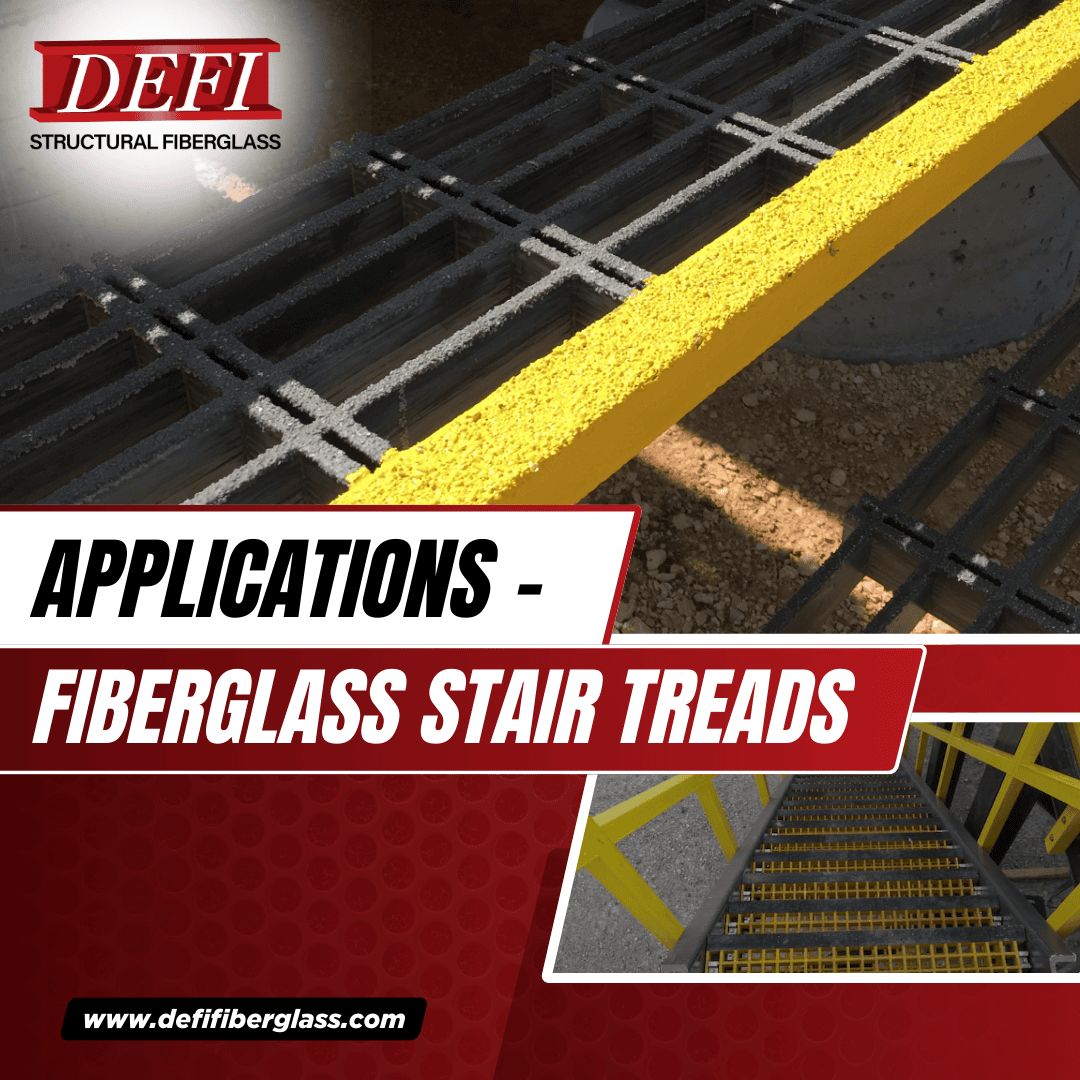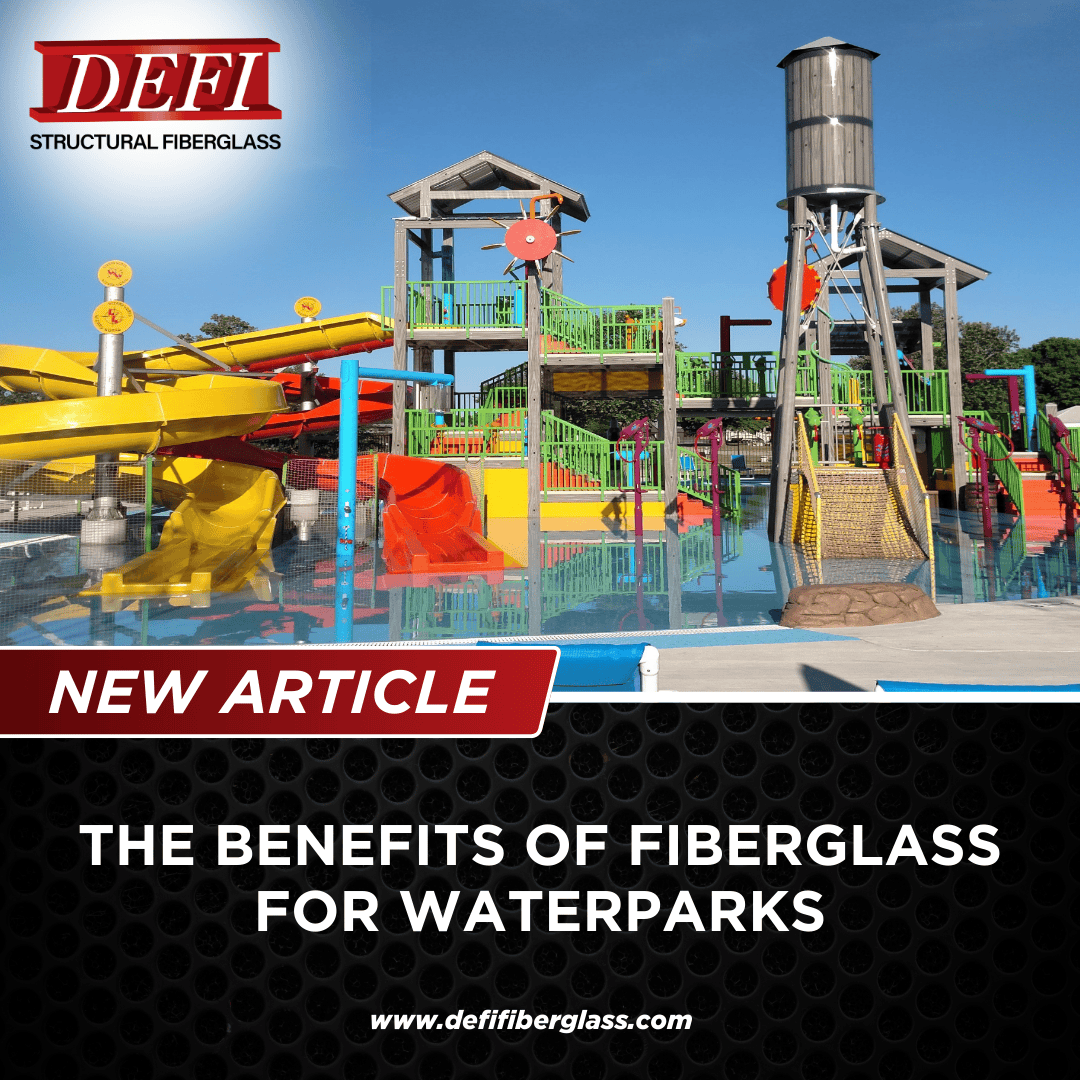A: FRP stands for fiber-reinforced plastics. It’s a generic term which can be used for different types of products in the marketplace. For us, we specialize in structural fiberglass—as in fiberglass channels, beams, square tubes, and fiberglass grating for walking surfaces—that is our specialty. We will take finished goods from the manufacturer and create fiberglass ladders, handrails, platforms—you name it. Anything you can build out of steel, we can build out of fiberglass.
This is honestly one of the most asked questions by customers when they contact us about their projects. Even though FRP has been widely used for well over 50 years—many people aren’t aware of what it can do. They don’t know how many industries benefit from it, and how many different products can be fabricated with FRP. There’s a lot about FRP that people don’t know about. We’re going to give you a quick rundown about FRP—what it is, how it’s used, and how it can benefit you. Now granted, this isn’t an in-depth look at all FRP benefits and products. Rather, this is just a quick overview to give you an idea of how these specific products we make can make a difference.
WHAT IS FRP?
This is usually the first question we get when we say “FRP.” As Arthur mentioned in the video FRP is a fiber-reinforced plastic—but there’s more to it. The reason it’s called that is because it is a composite material. It is comprised of a specific resin and thin strands of glass AKA, fiberglass, this combo makes it incredibly strong.
FRP is a tri-layered composite, with the structural layer being the core layer that gives it it’s strength. In this layer, the resins bind the glass fibers together giving it structural integrity.
The middle layer is the chemical barrier. This layer provides added chemical resistance that gives it extraordinary corrosive resistance. This is especially useful in industries such as oil and gas or marine installations.
The top layer is called the surface veil, or topcoat. Depending on the application it’s being manufactured for, the surface veil will give the product even more useful characteristics. Often it is formulated to boost anti-corrosion properties or temperature resistance. However, many different coatings are specialized for various needs.
All in all, the most alluring aspect of FRP is how strong it is—pound for pound as strong as steel. Also, the fact that it’s incredibly versatile, as it can adapt to endure any environment. In fact, FRP thrives in every environment where metal or wood struggles—that’s why so many industries depend on it.
WHAT ARE THE STRUCTURAL BENEFITS?
FRP is one of the most beneficial and valuable structural building materials with benefits that are both aesthetic and physical. Because of the long-term financial savings of FRP, many industries are using FRP as an alternative to traditional materials. These traditional materials pale in comparison to FRP in many different areas such as:
- Strength—versus steel, FRP is just as strong, while only a fraction of the weight. This translates into less expensive installations and shipping costs.
- Elasticity—Steel has no flex and is susceptible to damage from harsh impacts. Wood has flex but lacks in many other areas. Fiberglass is both strong and has ample flex to withstand impacts without denting.
- Durability—Steel rusts, wood rots, and regular polymers can shatter or warp. FRP on the other hand does not rust, will never rot, and will not shatter or warp. It outlasts every material easily.
- Adaptability— Due to the various options in resins and topcoats, FRP can be adapted for any environment, application, or hazard. Where other materials would succumb to degradation in these environments—FRP remains untouched. This is because the formula for FRP can be tweaked to fit any schematic and set of specific needs.
FRP can also be formed into any kind of shape and at any level of complexity. Using a combination of geometric shapes, we can create extremely complex structures. The thickness can be adjusted from as thin as 1/16 of an inch, all the way up to ½ inch thick if desired. There are even more shape options and thickness specifications available for uniformity and tight control. FRP can even be painted in the mold with a special gel that makes paint chipping, cracking, or flaking non-existent. FRP can hold it’s color and gloss for decades.
DEFI FRP PRODUCTS
The products we specialize in are structural fiberglass—that is, any piece that is used to build structures. Those structures could be catwalks, wellhead platforms, stairs, handrails, pedestrian bridges, and more. We use a variety of standard molds, as well as custom fabrications to create whatever our clients need for their project. Some of our top selling structural fiberglass products include our two top sellers:
Structural Grating
Our structural grating is by far one of our biggest sellers, especially from customers tired of dealing with corroded steel grating. The problem with steel grating is that it’s expensive to install, often requires concrete reinforcement, and then it can rust.
- It Saves You Money— The biggest impact will be on your bottom line when you switch to fiberglass grating. From the shipping to the installation to the maintenance-free, long lifespan—FRP is overall far less expensive.
- No Compromise On Strength— Just because FRP is less expensive than steel doesn’t mean you lose an advantage anywhere else. In terms of durability and strength, steel cannot best FRP. Our grating is just as strong as steel but without the disadvantages of steel.
- Safety—Our grating products can also be adapted with special features to accommodate your environment. For example, in the oil industry, the grating can have a non-slip texture added to it to mitigate fall risks. You also don’t worry about corrosion or broken grating as you do with steel in corrosive environments like offshore rigs.
- Acoustics— Ambient sound levels are one of the forgotten workplace hazards. Metal easily reflects the sound of machinery, vocals, and other noises. This can not only damage hearing for your workers but make verbal warnings hard to hear. Fiberglass is known for dampening noise and is used in recording studios often for that very reason.
- Non-Conductive—Electrical hazards are hard enough to manage without throwing metal walking surfaces into the mix. Fiberglass is an insulator and therefore protects workers against electrical shock.
Pultruded FRP Channels
Pultruded FRP channels are very useful for projects where metal or wood would be a liability. For example, in marine conditions, on an oil rig, or a project that needs easy installation. Due to our channels lightweight, simple installation requirements, durability, and long lifespan— they are used in many different ways including
- Construction and Infrastructure—FRP is frequently used for outdoor building projects due to its resistance to the elements. Channels can be shaped and cut with basic tools, which makes installation very efficient. Since they are virtually maintenance-free, the cost of ownership is also very low. You can find them used for flooring, handrails, railroad crossings, and more.
- Utilities and Telecommunications— Thanks to the non-conductive trait of our FRP channels as well as the durability, they are ideal for use in utilities. Their EMI/RFI transparency also makes them ideal for utility poles, trunking, fiber optic cable housing, and more.
- Tool Manufacturing— FRP can be made into such a variety of shapes, sizes, and dimensions that it’s ideal for tool handles. You will often find tools such as hammers, lawn tools, and shovels made with FRP handles.
- Sporting Goods And Recreational— Go to any playground or sporting goods store and you will find FRP products all over. Outdoor equipment needs to be able to withstand water, UV rays, heat, and extreme wear. Our channels are found in everything from outdoor patio furniture to high-end golf clubs, ski poles, paddles, and lacrosse gear.
HOW CAN DEFI PRODUCTS BENEFIT YOUR BUSINESS?
FRP is not going away anytime soon—in fact, its use is becoming a dominant material in dozens of industries. But, how can DEFI help your specific business—look around your facilities. Anywhere you have steel—we can do it cheaper, give you a better long-term ROI, and eliminate maintenance.
Contact us today to put a plan in action to make the switch to FRP products from DEFI.



